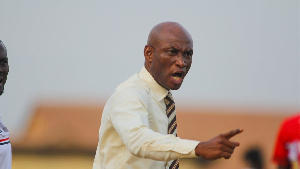efore her show, there existed among Ghanaian music lovers, a seemingly benign doubt in the practicality of a Cardi B stadium concert.
The Livespot X Festival’s choice of the American rapper was met with instant skepticism — an unequivocal questioning attitude that bared itself in a barrage of questions: had she accrued sufficient notoriety in the Shatta Wale–governed music state to merit a show in a forty-thousand-capacity arena, granted that in her home country of the US, and a few other destinations around the globe, a stadium show suited her status? Did the Grammy winner possess within her catalogue (the Gangster Bitch Music mixtape series and her 2018 debut, Invasion of Privacy) the songs to pull off a headline gig in an Afropop-loving town as Accra? Indeed, was the Ghana leg of the festival a mere addendum to her Nigeria appearance, which had taken place the day before?
By the time the Livespot X Festival closed, abruptly, on the morning of Monday, December 9, that pessimism had been confirmed — resoundingly so, too. The Cardi B Ghana showcase, which was propagated by organizers as the official grand starter to December revelries which climax “Year of Return’ activities, had floundered in key areas.
The musician, born Belcalis Marlenis Almánzar, has since admitted to an anticlimactic Ghana experience — which unfolds in two waves — in an Instagram post following the concert, but maintains an unfazed posture: “I was in Ghana for less than 24 hours. Went thru a lil [sic] dilemma but I still had fun.”
There’s the pre-show situation (or, how it was relayed). She was accused by some local celebrities for snubbing a “private, one-on-one” lunch/ meet-and-greet session scheduled with them, to engage in the recreational exercise of sun-bathing and kebab sampling. It promptly resulted in material for social media comedy, and even a song by singer Prince Bright. Cardi B addressed the claims, condemning her accusers of being way off-base, and warning that they had picked the wrong one to mess with. She explained in a viral clip, and the eventual met-and-greet hours before the concert that a) there was no such clause in her contract, and that she honoured it out of goodwill, and b) she was attending to her diarrhoea.
Then there’s the event itself; hugely under-booked, witnessing a late start, and entangled in prolonged technical hiccups. It is virtually customary for events in this town to be characterised by a bit of delay, sometimes longer than a bit. Anything exceeding than that and the inevitable consequence of poorly managed impatience begins to manifest. On the night, the pelting of empty and half-empty water bottles at the stage was the unanimous protest method. This occurred around 1 am, when patrons, upstanding for hours on end, frustrated by a combination of aching joints and generally uninspiring opening performances from Kweku Smoke, Ms Forson et al (and even known names like DJ Spinall, Vyrusky, and Seyi Shay) decided that it was time to let the organisers know — in forceful language — that had had it.
(Verily, verily I say unto you: it was generally easier for one’s attention to be held by a cosmopolitan assortment of delightful dames traipsing about in revealing apparel that revealed revealing tattoos than it was for proceedings from the stage. Case in point: the light-skinned woman in green velvet blouse, her butt cheeks bursting out of their designated province; or a slim-waisted, Corn-row rasta-sporting ebony prancing about in bright-orange leather pants. What it lacked in the organisation, the show, perhaps, compensated for in this department. Welcome entailment of the “Year of Return” exodus, maybe?)
Enough was enough, and nothing less than the appearance of the American star they had coughed up top cedi (the equivalent of $140 in some cases) would remedy the situation. Left with no choice, organisers complied. The “Bodak Yellow” star emerged, costumed in a seductive leather ensemble themed around the colours of Ghana’s national flag, and putting her fabled tattooed contours on full display. She was met with excited squeals from the VIP huddle before the stage, numbering a few hundred, and exceeding the number of patrons in the stands by an order of magnitude. It was the concentration point of happenings.
Before delving into her set, Cardi B, like radio veteran Eddy Blay, who functioned as host on the night, had done before her, apologised for the technical challenges — or sabotage, if one entertained rumours circulating widely in the hushed tones of well–placed sources and peddlers of conspiracy theory — but assured that she would “shut this bitch down” nonetheless.
Assisted by a hoarse-voiced hype man/ DJ, and a gang of half-naked, uncharismatic back-up dancers, the singer delivered brief renditions of her best-known songs, her set running for something in the neighbourhood of half-an-hour. On brand, Cardi B’s time onstage was attended by invective-induced verbiage and a nonchalant persona that has advanced her fame, and often landed her in trouble. For instance, her choice of preamble for the day’s rendition of “Money,” which saw her declare her observation that upon her arrival in the country, she noticed that “this country got money” is a reinforcement of condescending stereotypes held by the west about the continent of Africa. That pronouncement has largely been overlooked, maybe, due to the availability of “more interesting” pickings on her lavish Ghana fiasco serving.
Another preceded “Be Careful,” her aching address to an unfaithful lover. Whatever their geographical station, “men ain’t shit,” she held, venting passionately into a standing microphone draped in a Ghana flag. Somehow, she still managed to draw approving cheers from the same men. But that’s the thing: her magnetism stems from her pop-forwardness; courage to embrace risk. She’s a proponent of a curious brand of feminism; one that celebrates a woman’s sexuality, a soft power that permits her to make such declarations. A line in “Bodak Yellow” sings: “And I’m quick, cut a nigga off, so don’t get comfortable.”
If you haven’t noticed by now, Cardi B’s music is largely dedicated to pleasures of the flesh — and that’s an indubitable winning formula in this pop-dictated era. As for topping, she’s a bona fide hit maker, for “Bodak Yellow” remains among the biggest songs released in the last decade. Published in 2017, in support of her top-charting 2018 debut album which was named Best Rap album by the Grammy Academy back in February, making her the only solo female act to win the prize, “Bodak Yellow” is still highly flammable, for it served as one of the highlights from the show. On YouTube alone, it has been seen over eight hundred million times. She’s also author of the global fixtures “Press,” “Clout,” “Bartier Cardi” (all of which featured in her Ghana medley), and bearer of a deluge of the trophies which include — but are not limited to — multiple BET and BET Hip Hop Awards, American Music Awards, MTV Video Music Awards, four iHeartRadio Music Awards, Billboard Music Award, and two Guinness World Records.
It is important to state, nonetheless, that the rapper gave a decent account of herself. It is an undemanding task for a performer of her calibre, and personality; for which she has courted devoted followership for many years via viral clips on social media portals Vine and Instagram, as well as for her regular appearance in VH1 reality television series Love & Hip Hop: New York (2015–2017).
The crowd dispersed wearily following Cardi B’s exit, and did not reconvene fully; not during performances by Kofi Mole, or “Omo Ada” star, MEDiKAL. Sarkodie, Shatta Wale (who flamboyantly flew in for his soundcheck earlier in the day in a helicopter), Nigeria’s Tiwa Savage, and Patoranking?—?all high-profile acts on the roster?—?did not end up performing.
Two other deductions can also be drawn from the concert. First, last Sunday was again, confirmation that DJ Khaled’s “All I Do Is Win” is an uninventive resort for Ghanaian turntablists looking to revive a dormant crowd. The song has been overused, and deejays must release their hold on that record. Secondly, much to the chagrin of local music taste-makers/ gatekeepers, Nigerian music always comes to the rescue — and in this season, I specifically refer you to infectious sounds of Grammy hopeful, Burna Boy, and current legwork co-regents, Zlatan and Naira Marley.
Her Ghana stop, which completes her maiden African tour, has certainly chiselled out sour memory. And yet, Cardi B has transcended the Ghana situation in one piece, like only she can.













